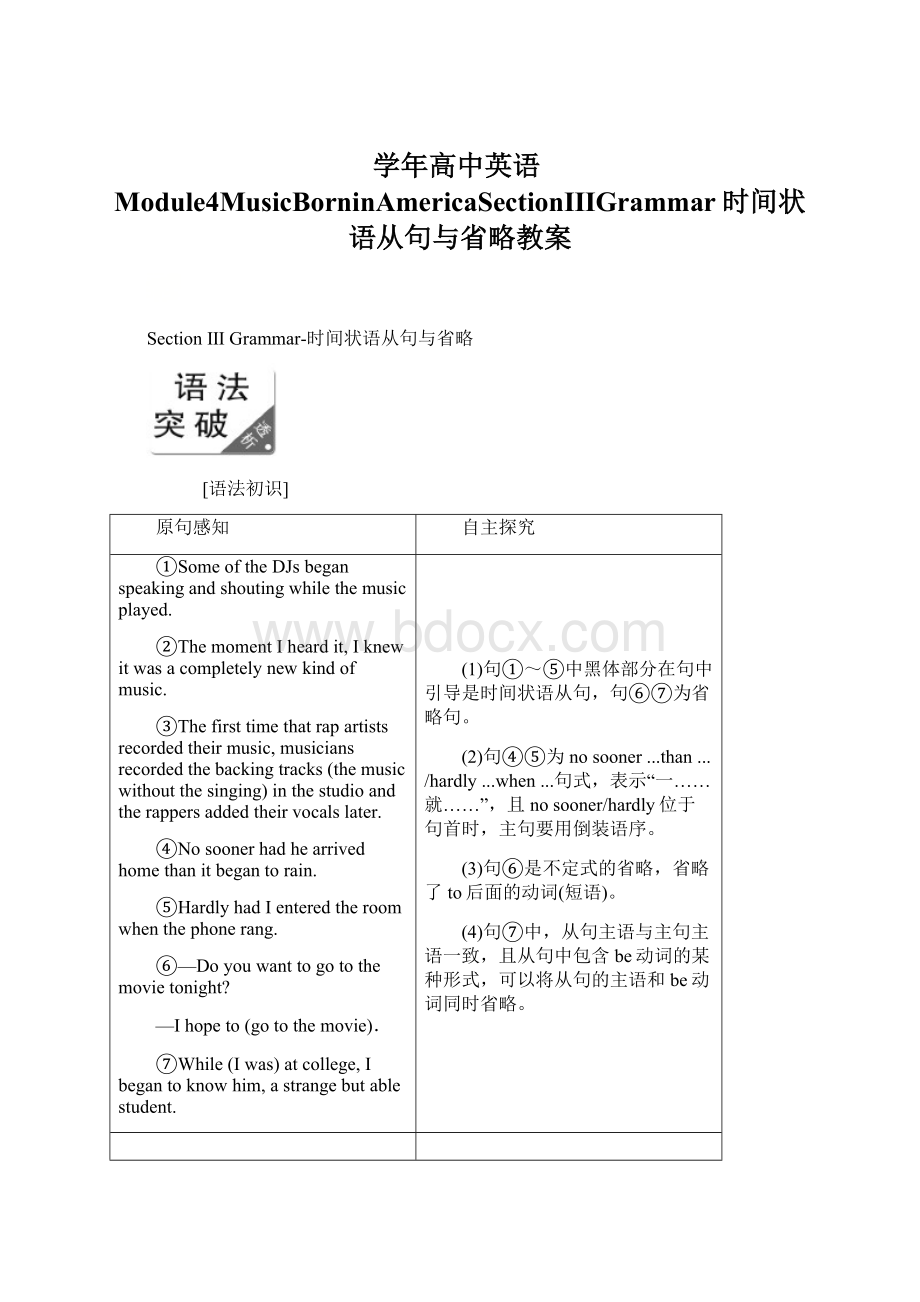学年高中英语Module4MusicBorninAmericaSectionⅢGrammar时间状语从句与省略教案.docx
《学年高中英语Module4MusicBorninAmericaSectionⅢGrammar时间状语从句与省略教案.docx》由会员分享,可在线阅读,更多相关《学年高中英语Module4MusicBorninAmericaSectionⅢGrammar时间状语从句与省略教案.docx(11页珍藏版)》请在冰豆网上搜索。

学年高中英语Module4MusicBorninAmericaSectionⅢGrammar时间状语从句与省略教案
SectionⅢGrammar-时间状语从句与省略
[语法初识]
原句感知
自主探究
①SomeoftheDJsbeganspeakingandshoutingwhilethemusicplayed.
②ThemomentIheardit,Iknewitwasacompletelynewkindofmusic.
③Thefirsttimethatrapartistsrecordedtheirmusic,musiciansrecordedthebackingtracks(themusicwithoutthesinging)inthestudioandtherappersaddedtheirvocalslater.
④Nosoonerhadhearrivedhomethanitbegantorain.
⑤HardlyhadIenteredtheroomwhenthephonerang.
⑥—Doyouwanttogotothemovietonight?
—Ihopeto(gotothemovie).
⑦While(Iwas)atcollege,Ibegantoknowhim,astrangebutablestudent.
(1)句①~⑤中黑体部分在句中引导是时间状语从句,句⑥⑦为省略句。
(2)句④⑤为nosooner...than.../hardly...when...句式,表示“一……就……”,且nosooner/hardly位于句首时,主句要用倒装语序。
(3)句⑥是不定式的省略,省略了to后面的动词(短语)。
(4)句⑦中,从句主语与主句主语一致,且从句中包含be动词的某种形式,可以将从句的主语和be动词同时省略。
[语法剖析]
语法点一
时间状语从句
1.由when,while,as引导的时间状语从句
when
从句中的谓语动词可以是延续性动词,也可以是瞬间动词。
从句的动作与主句的动作可以同时、之前或之后发生
while
从句中的动词只能是延续性动词,从句的动作与主句的动作同时发生
as
从句中的动词既可以是延续性动词,也可以是短暂性动词。
侧重指从句的动作与主句的动作同时进行,常译为“一边……一边……;随着”
Whenshecamein,Iwasdoingmyhomework.
当她进来时,我正在做作业。
When/whileIlivedwiththeSmiths,weusedtodiscussinternationalissuestogether.
我和史密斯一家住在一起时,我们经常一起讨论国际问题。
Asshegrewolder,shelostinterestingardening.
随着年龄越来越大,她对园艺失去了兴趣。
2.由till或until引导的时间状语从句
主句形式
主句谓语
意义
肯定句
用延续性动词
意为“直到……为止”,表示主句中的动作截止到从句动作发生时
否定句
用短暂性动词
意为“直到……才……”,表示主句中的动作开始于从句动作发生时
Hewaiteduntilshehadfinishedspeaking.
他一直等到她讲完。
Youcan'tgohomeuntilyoufinishyourwork.
工作完成后你才能回家。
[名师点津]
(1)till和until一般情况下两者可以互换,但till不可用于句首并且在强调句中多用until。
(2)如果将“notuntil...”结构放在句首,那么主句要部分倒装。
Itwasnotuntilthemeetingwasoverthathebegantotellmethesecret.
直到会议结束他才开始告诉我那个秘密。
Notuntilwepointedouttheirfaulttothemdidtheyrealizeit.
直到我们向他们指出,他们才意识到自己的错误。
3.由since引导的时间状语从句
(1)若since引导的状语从句的谓语动词是非延续性动词,则从句表示的时间是“从动作开始的那一时刻起”。
Wehavebeenmissingthemsincetheylefthere.
自从他们离开这儿以来我们一直想念他们。
(2)若since引导的状语从句的谓语动词是延续性动词或表示状态的动词,则从句表示的时间是“从延续性动作或状态结束时算起”。
HowlongisitsinceyoulivedinShanghai?
你多久不住在上海了?
4.由before引导的时间状语从句
(1)before意为“在……之前”,置于主句前后均可。
Beforethesunsets,wemustgohome.
太阳落山前,我们必须回家。
(2)如果before引导的从句位于主句之后,有时不能译成“在……之前”,而要译成“过了多久才……”“还未……就……”等。
ThestrugglelastedfouryearsbeforetheNorthwonintheend.
战争持续了4年北方才最终获胜。
Healmostknockedmedownbeforehesawme.
他几乎撞到我时才看见我。
SheleftbeforeIcouldhaveawordwithher.
我还没来得及和她说句话,她就离开了。
(3)before常用句型
Itwillbetwoyearsbeforeheleavesthecountry.
再过两年他才会离开这个国家。
5.由意为“一……就……”的词引导的时间状语从句
(1)immediately,instantly,directly,themoment/instant/minute(that)作连词引导时间状语从句,相当于assoonas,表示从句的动作一发生,主句的动作随即发生。
常译成“一……就……”。
Immediatelyyoubegintospeak,hegivesyouhisfullattention.
你只要一开始说话,他就会全神贯注地听。
(2)hardly/scarcely...when...和nosooner...than...也表示“一……就……”。
主句用过去完成时,when和than从句中用一般过去时。
当hardly/scarcely和nosooner位于句首时,主句应倒装。
Hardlyhadwebegunourwalkwhenitbegantorain.
我们刚开始散步天就开始下雨了。
6.由名词短语引导的时间状语从句
短语thefirst/lasttime,every/each/nexttime等也可作连词,引导时间状语从句。
EverytimeIcatchacold,Ihaveapaininmythroat.
每次感冒我的嗓子就疼。
HewaswritingaletterthefirsttimeIsawhim.
我第一次看到他时,他在写信。
7.bythetime引导的时间状语从句
Bythetimeyoucomeheretomorrow,Iwillhavefinishedthiswork.
你明天来这儿的时候,我将已经完成这项工作了。
[名师点津] bythetime引导的时间状语从句可用一般现在时表示将来,此时主句应使用将来完成时;当从句中用一般过去时时,主句应使用过去完成时。
集中演练1
1-1.单句语法填空
①Bythetimehewasfourteen,Einsteinhad_learned(learn)advancedmathematicsallbyhimself.
②Thediscussioncame(come)alivewhenaninterestingtopicwasbroughtin.
③Nosoonerhadhegottothestationthanthetrain_left(leave).
④Bythetimeheis60,hewill_have_retired(retire)fromhispresentposition.
⑤Greatchangeshavetakenplacesinceyoutoldmethetechniqueofsinging.
⑥Johnthinksitwon'tbelongbeforeheisreadyforhisnewjob.
⑦Helookedattheplanetakingofftill/untilitdisappeared.
⑧Jackwasworkinginthelabwhenthepowercutoccurred.
⑨Theboyburstintotearsimmediately(immediate)hesawhismother.
⑩Remembertosendmeaphotoofusthenexttimeyouwrite(write)tome.
1-2.单句改错
⑪Howtimeflies!
Ithasbeentwoweeksafterourwintervacationbegan.after→since
⑫Itwon'tbelongwhenwehavethemidtermexamination.when→before
⑬Everytimewhenhearrivedhomeattheendoftheday,we'dgreethimatthedoor.去掉when
⑭BythetimeJackreturnedhomefromEngland,hissongraduatedfromcollege.graduated前加had
语法点二
省 略
为了避免重复,可以省略句中的一些成分,这种现象叫省略。
常可省略句子中的主语、谓语动词、部分谓语(+宾语)、不定式符号to后的动词原形及其后的词语和句子中的一部分。
1.省略主语
(1)祈使句中通常省略主语you。
(2)在口语交际中常省略交际双方都清楚的主语,如I,you,it等。
(You)Leavehiminpeace!
不要去打扰他!
(I)Don'tknow.
我不知道。
(It)Lookslikerain.
像是要下雨了。
2.省略谓语
Who(comes)next?
谁下一个来?
Bobhasdonehishomework,butTomhasn't(donehishomework).
鲍勃已经做了家庭作业,但汤姆却没有(做家庭作业)。
Johnwasthewinnerin2017andBob(wasthewinner)in2018.
约翰是2017年的获胜者,鲍勃是2018年的(获胜者)。
3.省略表语
省略表语的情况比较普遍。
—Areyouready?
—Yes,weare(ready).
——你们准备好了吗?
——是的,我们准备好了。
4.动词不定式的省略
(1)在并列结构中为了避免重复,可省略后面的不定式符号to。
但如果句子前面出现过同样的动词,为避免重复,后面的不定式常省略动词原形,而保留不定式符号to。
Itisimpossibletolaughand(to)cryatthesametime.
同时又哭又笑是不可能的。
Youcandoitthiswayifyoucareto(doit).
如果你愿意可以这样做。
(2)在let,make,have等使役动词后和在see,hear,observe,notice,feel,watch等感官动词后用作宾语补足语的动词不定式一般省略to。
但变为被动语态时,to要保留。
Youhavemademe(to)feelsecure.
你使我感到安全。
Theboywasnoticedtoentertheoffice.
男孩被注意到进入了办公室。
(3)but表示“除了……之外”时,其前若有实义动词do的某种形式,but后的不定式须省略to。
Wehavenothingtodobut(to)wait.
我们现在除了等没有别的事可做。
5.省略句子中的一部分
在特定语境中,常省略与前面相重复的部分。
—WhogaveyouthatCD?
—Dad(gaveittome).
——谁给你的那张唱片?
——爸爸(给的)。
IlentittosomeonebutIcan'trememberwho(Ilentitto).
我把它借给某个人了,但我记不起是谁了。
Iftheweatherisfine,wewillgo.If(theweatheris)not(fine),(wewill)not(go).
如果天气好,我们就去。
如果天气不好,我们就不去。
[名师点津] 当后句与前句的用词和句式完全相同,只是前句为肯定,后句为否定时,常省略后句中与前句相同的部分,只保留否定词not。
6.从句中的省略
(1)宾语从句中若有两个或两个以上的that从句时,只能省略第一个that。
(2)定语从句中作宾语的关系代词that,which和whom是可以省略的。
(3)在时间、地点、条件、方式、让步等状语从句中,若从句的主语和主句的主语一致,且从句中的谓语部分含有系动词be或状语从句中有itis结构时,通常省略“主语+be动词”或“itis”。
Heactedasif(hewas)certainofsuccess.
他表现的就像一定会成功一样。
Unless(thislaw/itis)changed,thislawwillmakelifedifficultforfarmers.
除非加以修改,否则这条法律将给农民的生活造成困难。
Though(hewas)exhausted,hewenttobedverylate.
虽然他已筋疲力尽,但还是很晚才睡觉。
集中演练2
2-1.单句语法填空
①Didanyonenoticeastrangercome(come)intothebank?
②Thenextyear,aftergrowing(grow)muchtaller,Tomenteredtheschoolbasketballteameventually.
③Theseworkersmustweartheiruniformsandthemaskstokeeptheenvironmentcleanwhileworking(work).
④Whencompleted(complete),theamusementparkwillbeopentothepublicnextsummer.
⑤Unlessinvited(invite)togotohisbirthdayparty,Iwillbuynothingforhim.
2-2.句型转换
⑥Thoughhisfamilywaspoor,hisfamilymanagedtosendhimtoschool.
→Thoughpoor,_hisfamilymanagedtosendhimtoschool.
⑦WhileIwaswalkingalongthestreet,Iheardmynamecalled.
→Whilewalkingalongthestreet,Iheardmynamecalled.
⑧Youshouldn'tcometohispartyunlessyouareinvited.
→Youshouldn'tcometohispartyunlessinvited.
⑨Helookedeverywhereasifhewasinsearchofsomething.
→Helookedeverywhereasifinsearchofsomething.
⑩Ifitispossible,JohnwouldliketostudyChineseinBeijinginthefuture.
→Ifpossible,_JohnwouldliketostudyChineseinBeijinginthefuture.
⑪Johnworkedhardbuthisbrotherdidn'tworkhard.
→Johnworkedhardbuthisbrotherdidn't.
⑫Imeanttowritetoyou,butIforgottowritetoyou.
→Imeanttowritetoyou,butIforgotto.
⑬Hehasn'tfinishedhishomework,butheoughttohavefinishedit.
→Hehasn'tfinishedhishomework,butheoughttohave.
[链接高考]
单句语法填空
1.(2017·北京高考)Ifyoudon'tunderstandsomething,youmayresearch,study,andtalktootherpeopleuntilyoufigureitout.
解析:
考查状语从句。
句意:
如果你无法理解某个东西,你可能会探索、研究以及和其他人交谈,直到你把它弄明白。
根据句意,此处应用until引导时间状语从句,表示主句动作一直持续到until从句所表达的时间才结束。
2.(2016·全国卷Ⅲ)Overtime,as/whenthepopulationgrew,peoplebegancuttingfoodintosmallpiecessoitwouldcookmorequickly.
解析:
考查状语从句。
句意:
慢慢地,随着人口的增加(当人口增加时),为了使食物熟得更快,人们开始把食物切成小块。
根据句意可知,空格处填as或when,引导时间状语从句。
3.(2016·天津高考)Astheaverageageofthepopulationincreases,therearemoreandmoreoldpeopletocarefor.
解析:
考查状语从句。
随着人口平均寿命的延长,越来越多的老年人需要照顾。
此处as引导时间状语从句表示“随着”。
4.(2015·天津高考)Weneedtogettotherootoftheproblembefore_wecansolveit.
解析:
考查状语从句。
句意:
我们需要找出问题的根源才能解决问题。
before“在……之前”,在此引导时间状语从句。
5.(2015·北京高考)Ifaccepted(accept)forthejob,you'llbeinformedsoon.
解析:
考查状语从句的省略。
句意:
如果你被接受做这项工作的话,你将很快得到通知。
条件状语从句中省略了的主语you与accept之间构成被动关系,故用过去分词accepted。
6.(2014·湖南高考)Children,whenaccompanied_(accompany)bytheirparents,areallowedtoenterthestadium.
解析:
考查状语从句的省略。
句意:
有家长陪伴时,孩子们才被允许进入体育场。
在状语从句中,当主句主语与从句主语一致,且谓语动词含有be动词或be动词的某种形式时,可以省略从句中的主语和be。
设空处的完整形式为whentheyareaccompaniedby...,省略了theyare。
[针对演练]
Ⅰ.句型转换
1.Hemaynotbeathomethen.Ifheisnotathome,leavehimanote.
→Hemaynotbeathomethen.Ifso,_leavehimanote.
2.Shefellasleepwhileshewasdoingherhomework.
→Shefellasleepwhiledoingherhomework.
3.WhenTomsawMaryforthefirsttime,hewasimpressedwithher.
→The_firsttimeTomsawMary,hewasimpressedwithher.
4.Don'thesitatetocallmewhenyouareintrouble.
→Don'thesitatetocallmewhen_in_trouble.
5.Immediatelyhecamehome,hetoldmethenews.
→As_soon_as/The_momenthecamehome,hetoldmethenews.
6.Shewillnotgotobeduntilhersonreturns.(notuntil置于句首)
→Not_until_her_sonreturns_will_shegotobed.
7.Sheopenedhermouthasifshewantedtospeak.
→Sheopenedhermouthasiftospeak.
8.Hehasnothingtodo.Hehastosleep.
→Hehasnothingtodobut_sleep.
9.Whentheywerefirstintroduced